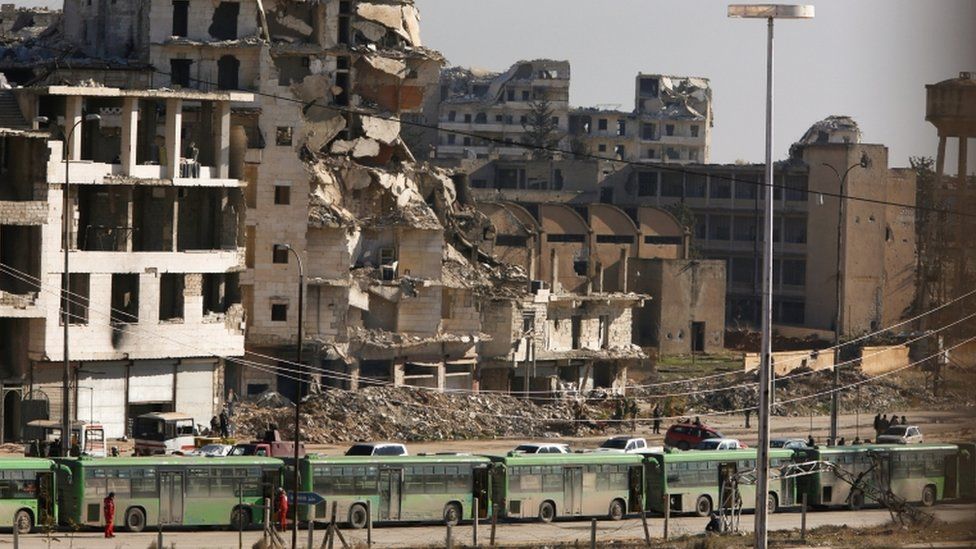Aleppo battle: Hopes rise for evacuation of rebel-held areas
- Published

Buses are again poised to start evacuations from a rebel-held enclave in the Syrian city of Aleppo under a renewed but fragile deal.
Fighters and civilians had been due to leave on Wednesday, but a ceasefire collapsed. Rebels say a new truce came into effect on Thursday morning.
One convoy of ambulances tried to leave but was shot at, rebel sources said.
Government forces took nearly all remaining rebel-held parts of Aleppo this week after a four-year battle.
Has the evacuation already started?
TV footage showed some ambulances moving towards eastern Aleppo, followed shortly after by a column of buses.
The Russian Tass organisation reported that the evacuation had begun, citing the Russian defence ministry.
Earlier reports from an ambulance service official in eastern Aleppo said that one convoy of ambulances did leave but had been shot at, and three people were injured. An opposition source told the BBC the convoy had headed back to eastern Aleppo.
Apparently referring to this, UN humanitarian adviser for Syria Jan Egeland suggested that the evacuation operation was "already ongoing and there have already been security incidences".
Ismail al-Abdullah, a volunteer for the White Helmets civil defence group, told the BBC that buses had now entered the area in which he was working and that he hoped the evacuation would now take place.
But the White Helmets tweeted that one senior volunteer had been shot and injured by a sniper while clearing an evacuation route for ambulances. In a separate tweet, the group said it was suspending its evacuation operation.
What are the players on the ground saying?
Syrian state TV said "4,000 rebels and their families would be evacuated from eastern districts on Thursday", adding that "all the procedures for their evacuation are ready".
Heavy shelling hit Aleppo on Wednesday
A statement from the Russian Centre for the Reconciliation of Opposing Sides in Syria, part of Russia's ministry of defence, said the Syrian authorities had guaranteed the safety of all members of the armed groups who decided to leave Aleppo.
Hezbollah, the Lebanese Shia Muslim movement backing the Syrian government, said there had been "big complications" but that "intensive contacts between the responsible parties... led to re-consolidating a ceasefire to exit armed fighters from eastern districts in the next few hours".
The rebels confirmed a new truce had come into effect at 03:00 GMT and that a new deal had been agreed.
Where will civilians, the wounded and rebels be taken?
Russia's defence ministry has said buses will take the injured, civilians and rebel fighters to the neighbouring province of Idlib, most of which is controlled by a powerful rebel alliance that includes the jihadist group Jabhat Fateh al-Sham.
The buses will reportedly leave Aleppo on the road through the government-controlled south-western district of Ramousseh heading towards the rebel-held town of Khan Touman, only about 8km (5 miles) away.
Hamish de Bretton-Gordon, director of Doctors Under Fire, said its plan was to take the wounded to its main hospital 25km away, over the Turkish border.
The Red Cross and Syrian Arab Red Crescent confirmed they would be involved in the operation to evacuate the wounded but had not yet started.
The BBC's Asaf Aboud, in Aleppo, says the government has indicated that the evacuated civilians will be able to choose whether they want to leave or stay in the city.
How many remain in eastern Aleppo?
It's believed up to 50,000 people remain. That is said to include about 4,000 fighters and about 10,000 family members of fighters.
Milad al-Shehabi, filmmaker in Aleppo tells BBC Newsnight: "This could be my last message"
UN envoy Staffan de Mistura says approximately 30% of the fighters are from the jihadist group formerly known as the al-Nusra Front.
Aleppo's besieged residents have faced weeks of bombardment and chronic food and fuel shortages.
Medical facilities in the city have largely been reduced to rubble, as rebels have been squeezed into ever-smaller areas by a major government offensive, backed by Russian air power.
Why did the earlier deal fail?
On Wednesday morning, buses and ambulances had been brought to evacuate rebel fighters and their families - only to be turned away shortly afterwards.
Syria's government and its ally Iran had insisted the evacuation from eastern Aleppo could happen only with the simultaneous evacuation of two villages - Foah and Kefraya - being besieged by rebels in north-western Syria.
Hours after the first agreement - brokered mainly by Russia and Turkey - collapsed, air strikes resumed over rebel-held territory.